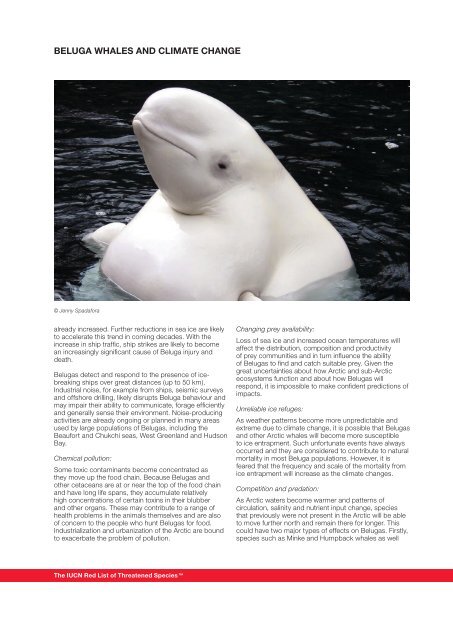Beluga WhaleS and Climate Change - IUCN
Beluga WhaleS and Climate Change - IUCN
Beluga WhaleS and Climate Change - IUCN
Create successful ePaper yourself
Turn your PDF publications into a flip-book with our unique Google optimized e-Paper software.
<strong>Beluga</strong> <strong>WhaleS</strong> <strong>and</strong> <strong>Climate</strong> <strong>Change</strong><br />
© Jenny Spadafora<br />
already increased. Further reductions in sea ice are likely<br />
to accelerate this trend in coming decades. With the<br />
increase in ship traffic, ship strikes are likely to become<br />
an increasingly significant cause of <strong>Beluga</strong> injury <strong>and</strong><br />
death.<br />
<strong>Beluga</strong>s detect <strong>and</strong> respond to the presence of icebreaking<br />
ships over great distances (up to 50 km).<br />
Industrial noise, for example from ships, seismic surveys<br />
<strong>and</strong> offshore drilling, likely disrupts <strong>Beluga</strong> behaviour <strong>and</strong><br />
may impair their ability to communicate, forage efficiently<br />
<strong>and</strong> generally sense their environment. Noise-producing<br />
activities are already ongoing or planned in many areas<br />
used by large populations of <strong>Beluga</strong>s, including the<br />
Beaufort <strong>and</strong> Chukchi seas, West Greenl<strong>and</strong> <strong>and</strong> Hudson<br />
Bay.<br />
Chemical pollution:<br />
Some toxic contaminants become concentrated as<br />
they move up the food chain. Because <strong>Beluga</strong>s <strong>and</strong><br />
other cetaceans are at or near the top of the food chain<br />
<strong>and</strong> have long life spans, they accumulate relatively<br />
high concentrations of certain toxins in their blubber<br />
<strong>and</strong> other organs. These may contribute to a range of<br />
health problems in the animals themselves <strong>and</strong> are also<br />
of concern to the people who hunt <strong>Beluga</strong>s for food.<br />
Industrialization <strong>and</strong> urbanization of the Arctic are bound<br />
to exacerbate the problem of pollution.<br />
the iuCn Red list of threatened Species <br />
Changing prey availability:<br />
Loss of sea ice <strong>and</strong> increased ocean temperatures will<br />
affect the distribution, composition <strong>and</strong> productivity<br />
of prey communities <strong>and</strong> in turn influence the ability<br />
of <strong>Beluga</strong>s to find <strong>and</strong> catch suitable prey. Given the<br />
great uncertainties about how Arctic <strong>and</strong> sub-Arctic<br />
ecosystems function <strong>and</strong> about how <strong>Beluga</strong>s will<br />
respond, it is impossible to make confident predictions of<br />
impacts.<br />
Unreliable ice refuges:<br />
As weather patterns become more unpredictable <strong>and</strong><br />
extreme due to climate change, it is possible that <strong>Beluga</strong>s<br />
<strong>and</strong> other Arctic whales will become more susceptible<br />
to ice entrapment. Such unfortunate events have always<br />
occurred <strong>and</strong> they are considered to contribute to natural<br />
mortality in most <strong>Beluga</strong> populations. However, it is<br />
feared that the frequency <strong>and</strong> scale of the mortality from<br />
ice entrapment will increase as the climate changes.<br />
Competition <strong>and</strong> predation:<br />
As Arctic waters become warmer <strong>and</strong> patterns of<br />
circulation, salinity <strong>and</strong> nutrient input change, species<br />
that previously were not present in the Arctic will be able<br />
to move further north <strong>and</strong> remain there for longer. This<br />
could have two major types of effects on <strong>Beluga</strong>s. Firstly,<br />
species such as Minke <strong>and</strong> Humpback whales as well

















